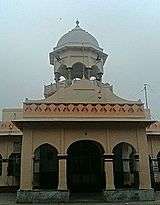Tibbia College
 | |
| Established | 1921 |
|---|---|
| Principal | Dr. Kamal Kishore Sijoria [1] |
| Location | Karol Bagh, New Delhi-110005. |
| Campus | Urban, 33.5 acres (0.136 km2)[2] |
| Affiliations | University of Delhi |
| Website | www.du.ac.in |
Tibbia College, also known as The Ayurvedic and Unani Tibbia College, is a public university located in New Delhi, India. The university, which offers education and training in Ayurvedic and Unani medicine, has its origins dating back to the late 19th century. The college, which was inaugurated by Mahatma Gandhi in 1921, offers bachelor's degrees in Ayurvedic Medicine and Surgery and Unani Medicine and Surgery.
On February 15, 2008, a 60-bed maternity and child block in Tibbia College Hospital, and the Delhi government announced about its intentions of developing the college into a university, in recognition of the college's contributions to Ayurvedic and Unani medicine.[3]
History
Beginning years
It was first established by Hakim Abdul Majeed in 1882 in Gali Qasim Jan, a locality in Chandni Chowk, one of the oldest and busiest markets in New Delhi, India. In 1889, after inauguration by a local commissioner, it was referred to as Madrasa Tibbia that functioned under the Anjuman-e-Tibbia society.[2] After the death of Majeed in 1901, his younger brother Hakim Wasil took over the Madrasa and in 1903, Masih-ul-Hakim Ajmal, better known as Hakim Ajmal Khan raised the quality of the institution.[2] The efforts of Ajmal Khan helped extend the site over an area of 50 acres including a garden of herbs.
Inauguration
Lord Hardinge, the then Viceroy of India laid the foundation stone of the Tibbia College on March 29, 1916. The College then had buildings that housed classrooms, laboratories, hospital pharmacies, hostels, office and staff quarters.[2] A mix of classical, colonial, Mughul and Indian architecture was utilized for constructing the College buildings.[2] This institution was inaugurated by Father of the Nation Mahatma Gandhi on 13th Feb.,1921.[4] Ajmal Khan previously corresponded with Mahatma Gandhi during the Khilafat Movement, a political campaign launched mainly by Muslims in British India in the aftermath of the World War I and because of his close association with Gandhi, on February 13, 1921, the latter formally inaugurated the College.[5][6]
Effect of Partition Riots
The Partition Riots which spread to Delhi in September 1947 affected the functioning of the college.The refugees who settled in Karol Bagh took possession of the college building and its all furniture was disposed of,its property was ransacked and its boarding house was also occupied.This whole episode severely affected the working of the college.A majority of members of the governing body and students were Muslims, and many of them including Ajmal khan family members of the founder Hakim Ajmal Khan migrated to Pakistan in December 1947.[7][8]
Activities
Research era
It was Hakeem Ajmal Khan who brought two ancient systems of medicine, Ayurvedic and Unani, to one platform resulting in the institution to be one of its kind in India.[2] The main objective behind the institution is to promote Indian medical science and to amalgamate both these systems of medicine. Dr. Salimuzzaman Siddiqui, a notable Pakistani scientist in natural products chemistry was requested by Hakeem Ajmal Khan to initiate the Ayurvedic and Unani Tibbi Research Institute.[9] He continued to be the institute’s director until after Ajmal Khan’s death in 1927.[5][9]
Besides the college and hospital, Ajmal Khan helped establish Hindustani Dawakhana and Ayurvedic Rasayanashastra for manufacturing medicines.[2] The Dawakhana, which appears as a Gothic cathedral with its curious blend of Asiatic and Latin architecture,[10] was founded in 1910. Due to the availability of the herbal garden within its campus, the dispensary was able to obtain patents for 84 rare herbal formulae like Musafi, Sarbat-e-Sadar, Sekhon and Hebab-Kebatare.[10] The institution developed and researched several unparalleled medicines, such Rauwolfia serpentina, the medicine to recover the lunatic mind.[2]
Administration
In 1973, the college was affiliated to the University of Delhi.[2] The four and a half year bachelor's degrees that are offered by the university are
- Bachelor of Ayurvedic Medicine and Surgery (BAMS)
- Bachelor of Unani Medicine and Surgery (BUMS)
Management
Previously this college and allied units were managed by a Board established under Tibbia College Act,1952. This Act now has been repealed by a new Act known as Delhi Tibbia College(Take Over) Act, 1998 and enforced by the Govt. of NCT of Delhi w.e.f. 1 May 1998.[11]
See also
References
- ↑ "Holistic living". The Times of India. 22 June 2004.
- 1 2 3 4 5 6 7 8 9 Sah, Ram Swarth (2003-12-25). "Old medicine, new learners". The Hindu. Retrieved 2007-12-15.
- ↑ "Tibbia College to become a university". The Hindu. 2007-12-15. Retrieved 2007-12-15.
- ↑ http://www.delhi.gov.in/wps/wcm/connect/doit_health/Health/Home/Ayurvedic+and+Unani+Tibbia+Collage/
- 1 2 "The Hakims of Sharif Manzil". The Hindu. 2004-06-28. Retrieved 2007-12-15.
- ↑ R.V. Smith (Mar 28, 2005). "Moghul imprints in Delhi". The Hindu.
- ↑ A History of Educational Instituions in Delhi. Sanbun Publishers.
- ↑ Ajay Kumar Sharma. "A History of Educational Instituions in Delhi". Sanbun Publishers.
- 1 2 Sandilvi, Ahmed (2003-04-12). "Salimuzzaman Siddiqui: pioneer of scientific research in Pakistan". Dawn. Retrieved 2007-12-15.
- 1 2 Basu, Arundhati (2003-06-16). "Ajmal Khan's Dawakhana gets new lease of life". The Times of India. Retrieved 2007-12-15.
- ↑ http://www.delhi.gov.in/wps/wcm/connect/doit_health/Health/Home/Ayurvedic+and+Unani+Tibbia+Collage/ at Delhi Government
External links
- Ayurvedic and Unani Tibbia College at Delhi University website
- Ayurvedic and Unani Tibbia College wikimapia
- Delhi government page
- A History of Educational Instituions in Delhi
Coordinates: 28°39′21″N 77°11′41″E / 28.65583°N 77.19472°E